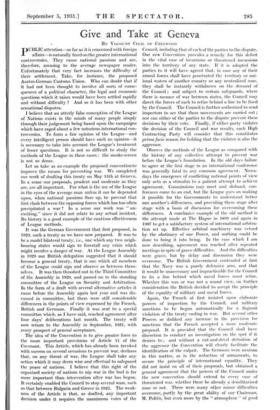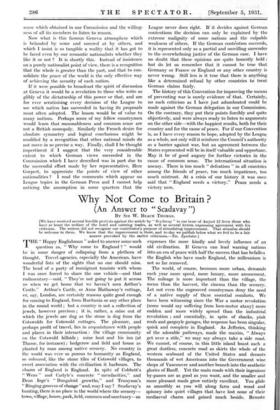Give and Take at Geneva
CHELWOOD • BY VISCOUNT CECIL OF
PUBLIC attention—so far as it is concerned with foreign affairs—is naturally fixed on the greater international controversies. They cause national passions and are, therefore, amusing to the average newspaper reader. Unfortunately that very fact increases the difficulty of their settlement. Take, for instance, the proposed Austro-German Customs Union. Who can doubt that if it had not been thought to involve all sorts of conse- quences of a political character, the legal and economic questions which it raises would have been settled rapidly and without difficulty ? And so it has been with other sensational disputes.
I believe that an utterly false conception of the League of Nations exists in the minds of many people simply through their judgement being based upon the campaigns which have raged about a few notorious international con- troversies. To form a fair opinion of the League—and every intelligent person should have such an opinion—it is necessary to take into account the League's treatment of lesser questions. It is not so difficult to study the methods of the League in these cases : the smoke-screen is not so dense.
Let us take as an example the proposed convention to improve the means for preventing war. We completed our work of drafting this treaty on May 15th at Geneva. In a sense our proposals, prudent and moderate as they are, are all important. For what is the use of the League in the eyes of the average man unless it can be depended upon, when national passions flare up, to prevent that first clash between the opposing forces which has too often precipitated a war ? In a sense our work was " un- exciting," since it did not relate to any actual incident. Its history is a good example of the cautious effectiveness of League methods.
It was the German Government that first proposed, in 1929, such a treaty as we have now prepared. It was to be a model bilateral treaty, i.e., one which any two neigh- bouring states would sign to forestall any crisis which might involve a danger of war. At the League Assembly in 1929 our British delegation suggested that it should become a general treaty, that is one which all members of the League could sign and observe as between them- selves. It was then thrashed out in the Third Committee of the Assembly in 1929, and passed on to the standing committee of the League on Security and Arbitration. In the form of a draft with several alternative articles it came before the Assembly again last year and was dis- cussed in committee, but there were still considerable differences in the points of view expressed by the French, British and Germans. Finally it was sent to a special committee which, as I have said, reached agreement after four days' deliberations last month. The treaty will now return to the Assembly in September, 1931, with every prospect of general acceptance.
The idea of the Convention is to give greater force to the more important provisions of Article 11 of the Covenant. This Article, which has already been invoked with success on several occasions to prevent war, declares that, on any threat of war, the League shall take any action which it may deem wise and effectual to safeguard the peace of nations. I believe that this right of the organized society of nations to nip war in the bud is far more important than intervention after war has begun. It certainly enabled the Council to stop several wars, such as that between Bulgaria and Greece in 1925. The weak- ness of the Article is that, as drafted, any important decision under it requires the unanimous votes of the Council, including that of each of the parties to the dispute.
Our new Convention provides a remedy for this defect in the vital case of incursions or threatened incursions into the territory of any state. If it is adopted the parties to it will have agreed that, in case any of their armed forces shall have penetrated the territory or nat- ional waters of another country or any neutralized zone, they shall be instantly withdrawn on the demand of the Council ; and subject to certain safeguards, where there is menace of war between states, the Council may direct the forces of each to retire behind a line to be fixed by the Council. The Council is further authorized to send inspectors to see that these movements are carried out ; nor can either of the parties to the dispute prevent these decisions by their vote. Finally, if either party violates the decision of the Council and war results, each High Contracting Party will consider that this constitutes prima facie reason for holding that the violator is also the aggressor.
Observe the methods of the League as compared with the history of any collective attempt to prevent war before the League's foundation. In the old days failure to agree at the first stage in an international conference was generally fatal to any common agreement. Nowa- days the emergence of conflicting national points of view only acts as a stimulus to a patient attempt to achieve agreement. Commissions may meet and disband, con- ferences come to an end, but the League goes on making it possible for the Governments to understand better one another's differences, and providing them stage after stage with a basis of discussion for overcoming these differences. A conclusive example of the old method is the attempt made at The Hague in 1899 and again in 1907 to get a satisfactory system of international arbitra- tion set up. Effective arbitral machinery was vetoed by the obstinacy of one Power, and nothing could be done to bring it into being. In the case which I am now describing, agreement was reached after repeated meetings in spite of grave difficulties. And the difficulties were grave, but by delay and discussion they were overcome. The British Government contended at first that the Navy was a purely defensive arm, and that it would be unnecessary and impracticable for the Council to fix a line behind which naval forces must retire. Whether this was or was not a sound view, on further consideration the British decided to accept the principle of the equality of military and naval forces.
Again, the French at first insisted upon elaborate powers of inspection by the Council, and military sanctions to be begun automatically for a flagrant violation of the treaty ending in war. But several other Powers so disliked any increase in the provision for sanctions that the French accepted a more moderate proposal. It is provided that the Council shall have discretion to conduct an investigation on the spot if it desires to ; and without a cut-and-dried definition of the aggressor the Convention will clearly facilitate the identification of the culprit. The Germans were anxious in this matter, as in the reduction of armaments, to secure the principle of international equality. They did not insist on all of their proposals, but obtained a general agreement that the powers of the Council under the new convention should extend to every case of threatened war, whether there be already a demilitarized zone or not. There were many other minor difficulties overcome, partly by the great ability of our Chairman, M. Politis, but even more by the " atmosphere " of good sense which obtained in our Commission and the willing- ness of all its members to listen to reason.
Now what is this famous Geneva atmosphere which is belauded by some and sneered at by others, and which I insist is so tangible a reality that it has got to be faced even by our romantic nationalists whether they like it or not ? It is shortly this. Instead of insistence on a purely nationalist point of view, there is a recognition that the whole is greater than the part, and that to con- solidate the peace of the world is the only effective way of achieving the security of each nation.
If it were possible to broadcast the spirit of discussion at Geneva it would be a revelation to those who write so glibly of the dictatorship of this power or that, and are for ever scrutinising every decision of the League to see which nation has succeeded in having its proposals most often adopted. The lesson would be of value to many nations. Perhaps some of my fellow countrymen would learn that reasonableness and common sense are not a British monopoly. Similarly the French desire for absolute symmetry and logical conclusions might be modified by a recognition that other national minds do not move in so precise a way. Finally, shall I be thought impertinent if I suggest that the very considerable extent to which German views succeeded in the Commission which I have described was in part due to the successful effort made by her representative, Herr Goepert, to appreciate the points of view of other nationalities ? I read the comments which appear on League topics in the German Press and I cannot help noticing the assumption in some quarters that the League never does right. If it decides against German contentions the decision can only be explained by the extreme malignity of some nations and the culpable weakness of others. If the German contention succeeds, it is represented only as a partial and unwilling surrender to the overwhelming justice of the German case. I have no doubt that these opinions are quite honestly held : but do let us remember that it cannot be true that Germany or France or England or any other country is never wrong. Still less is it true that there is anything like a determined refusal by other countries to treat German claims fairly.
The history of this Convention for improving the means of preventing war is surely evidence of that. Certainly, no such criticism as I have just adumbrated could be made against the German delegation in our Commission. On the contrary, they put their points forcibly and quite objectively, and were always ready to listen to arguments on the other side—with the happiest results, both for their country and for the cause of peace. For if our Convention is, as I have every reason to hope, adopted by the League as a whole, not only will it reinforce the Council's authority as a barrier against war, but an agreement between the States represented will be in itself valuable and opportune. May it be of good augury for further victories in the cause of common sense. The international situation is uneasy. There is too much " defeatism " in all countries among the friends of peace, too much impatience, too much mistrust. At a crisis of our history it was once said that " England needs a victory." Peace needs a victory now.































 Previous page
Previous page